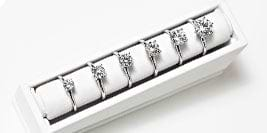Human Right Watch shed light on the underlying issues of mining diamonds and gold. We applaud the companies that are taking the steps in order to support the human rights but more can be done and more should be done. Human Right Watch conducted a study in which they questioned 13 major jewelry companies about their accountability on human rights. None of these companies scored an excellent rating for their sourcing policies and practices.
Buying something shiny for #valentinesday? Choose something not involving child labor--@hrw can help. https://t.co/LPC5wat36S pic.twitter.com/Kc3FKGSRhR
— Heather Barr (@heatherbarr1) February 9, 2018
Many jewelers, not just the ones listed above, rely on the Responsible Jewellery Council (RJC) and the Kimberley Process for setting the standard of ethical sourcing.
Human Rights Watch stated that, “The RJC has positioned itself as a leader for responsible business in the jewelry industry, but has flawed governance, standards, and certification systems.” This is not enough and jewelers need to be held accountable.
It’s unfortunate that these jewelers continue using the Kimberley Process Certification Scheme (KPCS) to comfort consumers who have concerns about conflict diamonds. The truth is, it has been proven time and time again that the KPCS is unsuccessful in preventing diamonds mined under horrific conditions from hitting the international diamond market.
The main problem is that the definition of a ‘conflict-diamond’ is too narrow. The KPCS defines a conflict diamond as a, “rough diamond mined in an area controlled by insurgent forces whose sale is used to finance anti-government military action.” This means that diamonds mined like those in Zimbabwe notoriously associated with the killing, raping and maiming hundreds of artisanal miners are considered “conflict-free” under the KPCS. This is because despite being mined under extreme human rights abuses, they did not fund armed forces. These “dirty diamonds” are being certified by the Kimberley Process, making them “clean” and then sold to unassuming diamond consumers who think they are purchasing “conflict-free” stones.
Even in 2018, the conditions of diamond mines remain brutal. Mines have harmed or killed child and adult workers, destroyed local communities and ensued war. Retail chains covered in this report should follow MiaDonna and The Greener Diamond’s lead. It’s not about lab-grown diamonds vs. earth-mined diamonds, it's about business ethics. They need to review existing business practices and reaffirm areas of strength, while also identifying areas for improvement. Action needs to be taken.
We are advocating for policies that are transparent, traceable and accountable. As a consumer, keep asking questions.
What is the origin of the diamond? Was it responsibly sourced? What is the origin of the gold? Was it responsibly sourced? When shopping for your conflict-free jewelry, be sure to ask how it’s sourced.
As a retailer, do you consider your products conflict free? Do you abide by the Kimberley Process Certification Scheme? Are you a member of the Responsible Jewellery Council? If so, this isn’t enough.
Join us and Human Right Watch to keep the conversation going. #BehindTheBling
Learn more about this in our latest article, Blood Diamonds in 2023: What Most Jewelers Don't Want You to Know.





























